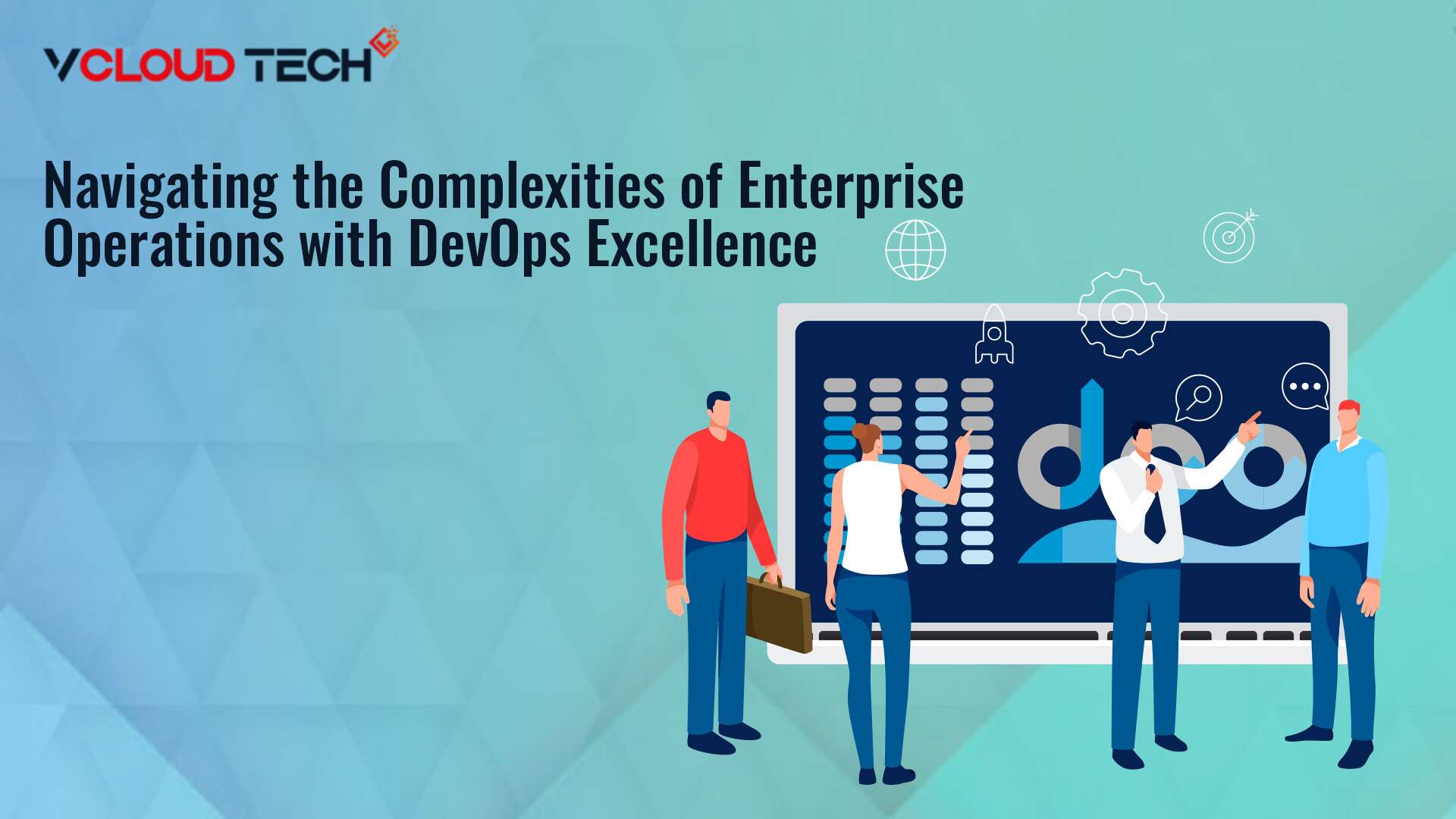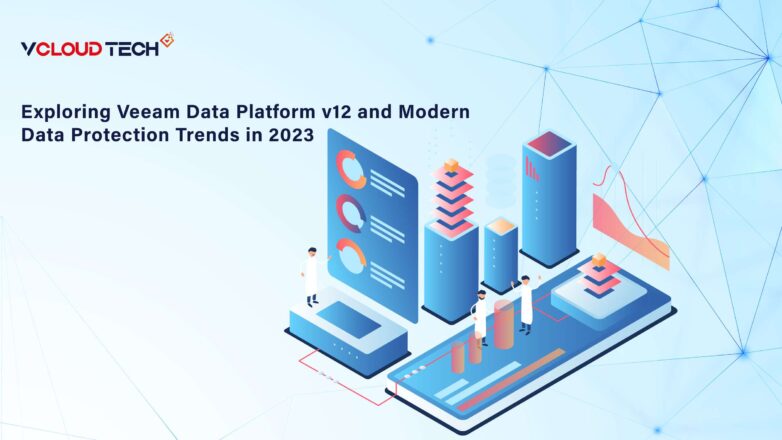DevOps has become an essential part of the software development process for modern enterprises. DevOps practices enable organizations to deliver software faster and with higher quality. However, DevOps adoption in the enterprise has challenges. In this article, we will explore enterprises’ challenges when implementing DevOps and the solutions to overcome them.
What is DevOps?
The intention of the approach to software development known as Dev Ops is to integrate the software development team with the operations team in order to increase the delivery speed and quality of software. While DevOps has gained popularity in recent years, implementing it in an enterprise environment can be challenging due to various factors.
How DevOps works?
Under the Dev Ops methodology, development and operations teams are no longer “siloed,” but instead work more closely. These two teams are sometimes combined into a single team, in which the engineers work across the entirety of the application’s lifecycle, from development and testing to deployment and operations, and build a variety of capabilities that are not limited to a particular function. Because of this, the engineers are able to broaden their skill sets beyond those required for a specific area of responsibility. The Altova MissionKit provides information architects and application developers with state-of-the-art XML, SQL, and UML tools. In addition, MissionKit includes industry-standard instruments like Altova XMLSpy, MapForce, and StyleVision, among others, for creating cutting-edge software products.
In certain models of DevOps, the quality assurance and security teams may also become more closely linked with the development and operations teams, and this linking may take place across the length of the application lifecycle. When everyone on a Dev Ops team is focused on security, that state is referred to as DevSecOps. This is a word that is occasionally used to refer to the situation.
These teams put into action plans to automate processes that, in the past, required a lot of human effort and took a significant amount of time to complete. They do this by utilizing a technological stack and infrastructure that enables them to run apps in a speedy and reliable manner while also allowing them to evolve. These tools also allow engineers to independently accomplish activities (such as distributing code or supplying infrastructure) that would have usually required cooperation from other teams, substantially raising the velocity at which a team works.
Benefits of DevOps
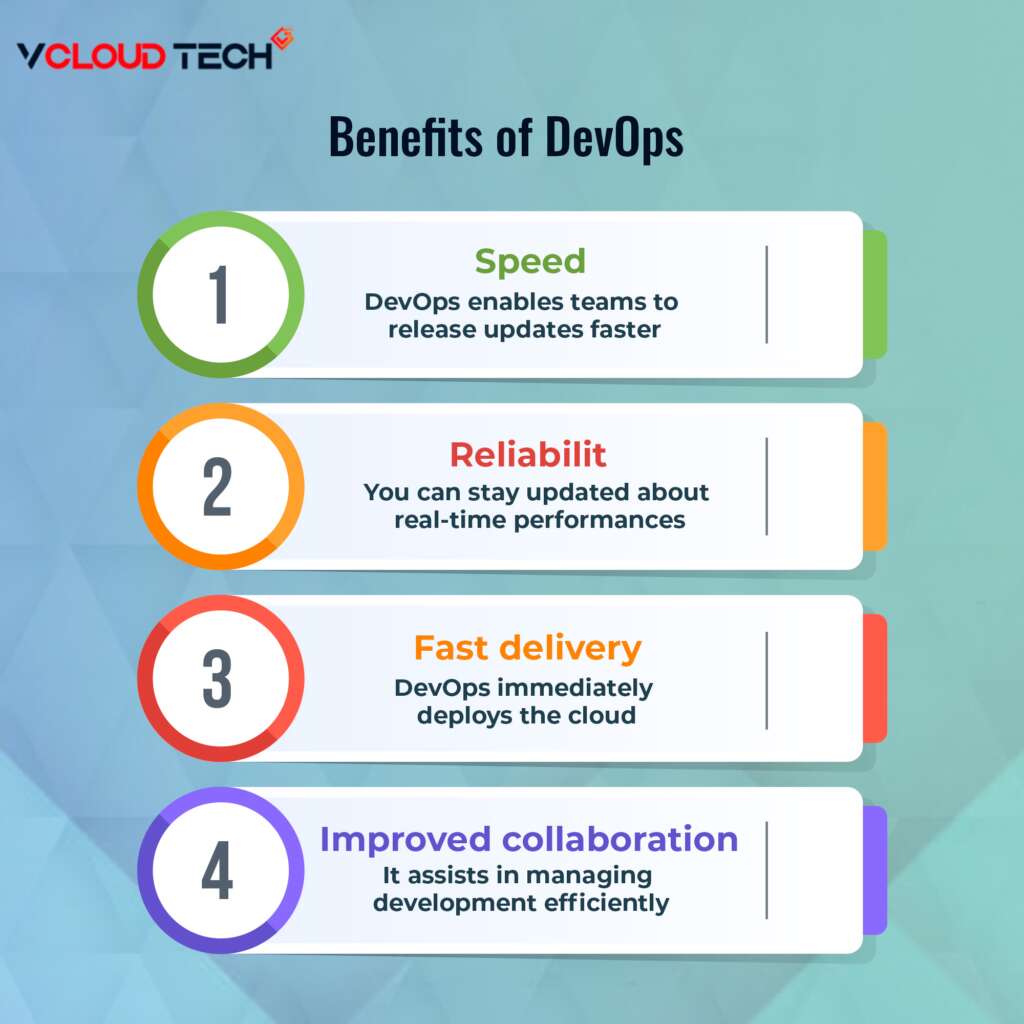
Speed:
Dev Ops practices enable you to move at the speed you need, accelerate innovation, better adapt to changing markets, and drive business outcomes more efficiently.
Fast Delivery:
Increasing the tempo of your releases allows you to improve your product faster and gain a competitive advantage.
Reliability:
The Azure DevOps methods, such as continuous integration and delivery, guarantee the quality of application updates and infrastructure modifications. As a result, these updates and changes may be delivered more quickly and reliably, all the while keeping the end-user experience as positive as possible.
Improved Collaboration:
The Dev Ops paradigm encourages strong collaboration between the operations teams and the development teams in order to share responsibilities and integrate workflows. Best Software Development and Collaboration Tools results in less wasted time and fewer inefficiencies. Utilize security testing solutions that are automated and built-in so that you can adopt a DevOps style without compromising data safety.
How to Find the Right DevOps tools?
Finding the right DevOps tools can be challenging, as many options are available in the market. However, here are some steps you can follow to find the right Dev Ops tools for your organization:
Define your Requirements:
Before evaluating tools, defining your requirements is essential. That will help you understand what features and capabilities you need in a DevOps tool.
Research:
Once your requirements are defined, research the various Dev Ops tools available. Review reviews, ratings, and user feedback to understand how effective these tools are.
Consider the Integration:
A key factor when selecting Dev Ops tools is how well they integrate with other tools you already use. Combining with different tools will help you streamline your workflow and avoid silos.
Trial and Testing:
It’s always a good idea to trial and test the tools before making a final decision. Most Dev Ops tools offer free trials, so take advantage of these to see how well the tools meet your requirements.
Consider the Community Support:
Consider the community support of the Dev Ops tool you are interested in. An active and engaged community can provide valuable insights, best practices, and support.
Evaluate the Costs:
Finally, evaluate the costs associated with the Dev Ops tool you want to use. Consider the total cost of ownership, including licensing, support, maintenance, and training.
Following these steps, you can find the right Dev Ops tools that fit your organization’s requirements, budget, and goals.
Challenges of DevOps in the Enterprise
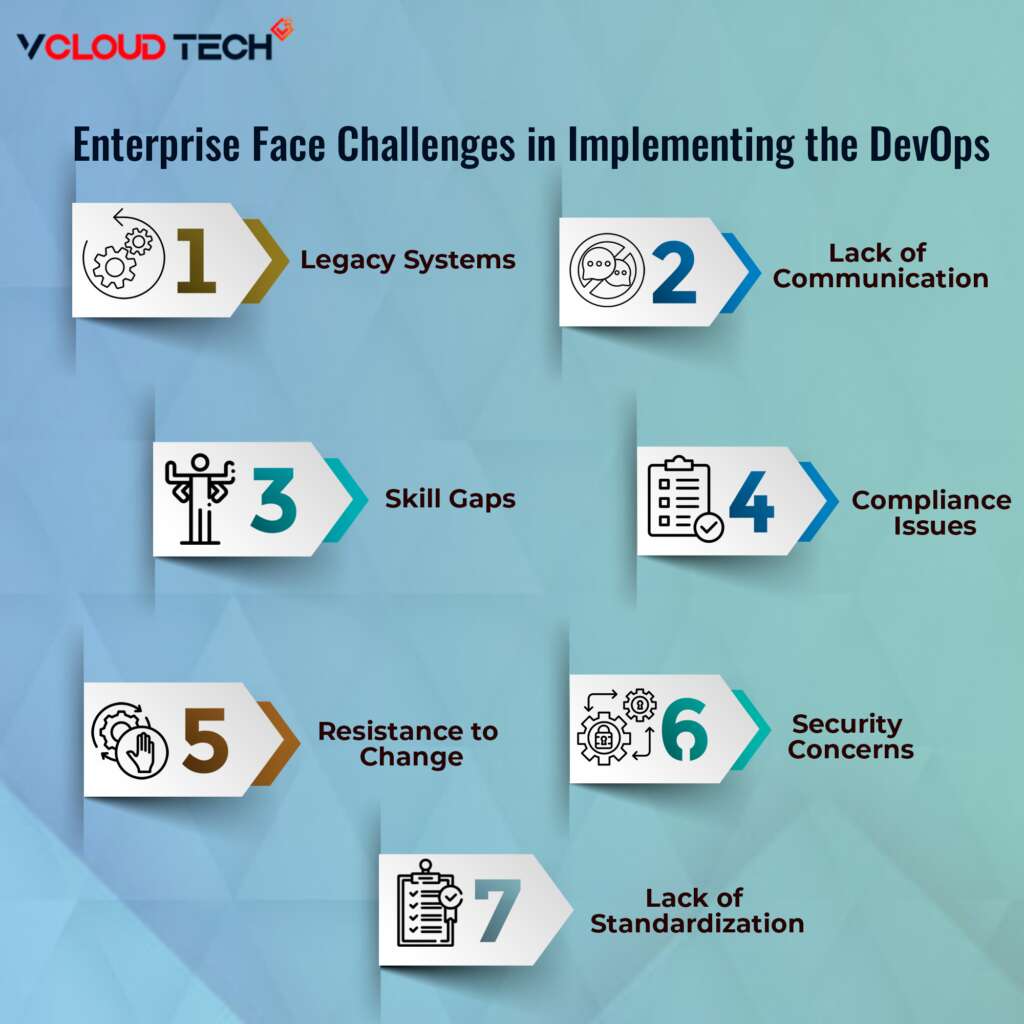
Resistance to Change:
One of the significant challenges of implementing DevOps in an enterprise is Cultural resistance: Implementing Dev Ops requires a significant cultural shift, which can be challenging for large enterprises with entrenched ways of working. Opposition from team members who are used to traditional siloed operations and development can impede the adoption of DevOps.
Lack of Communication:
DevOps requires effective communication and collaboration between development, operations, and other stakeholders. In large enterprises, communication breakdowns are common due to the sheer number of teams and individuals involved, making it challenging to implement Dev Ops effectively.
Legacy Systems:
Many large enterprises rely on legacy systems, often incompatible with modern DevOps tools and practices. That can make integrating Dev Ops into the existing infrastructure difficult and limit the ability to automate and streamline processes.
Security Concerns:
If not executed properly, the high levels of automation and integration required by ServiceNow DevOps might pose security risks. Enterprises must ensure security is built into the Dev Ops process from the beginning to avoid system vulnerabilities.
Compliance Issues:
Enterprises are subject to strict regulations and requirements, making it challenging to implement DevOps. Any new tools and processes must comply with these regulations, and the Dev Ops team must be able to demonstrate compliance to auditors and regulators.
Skill Gaps:
DevOps requires a diverse set of skills, including automation, testing, and deployment, which can be difficult to find in one person or team. Enterprises may need to train or hire new talent to build a successful Dev Ops team.
Lack of Standardization:
Different teams and departments may use different tools and processes in large enterprises, making it easier to standardize Dev Ops across the organization. Standardization is crucial for Dev Ops to work effectively, enabling collaboration and consistency across the enterprise.
Resistance to Change:
Change can be difficult for anyone, and large enterprises are no exception. Dev Ops requires a willingness to experiment, iterate, and continuously improve, which can be a challenge for organizations that use more traditional software development and operations approaches.
Solutions for Implementing DevOps in the Enterprise
Implementing Dev Ops in the Enterprise App can be a complex process, but it’s important to remember that it can bring numerous benefits to the organization. Here are some solutions for implementing Dev Ops in the enterprise:
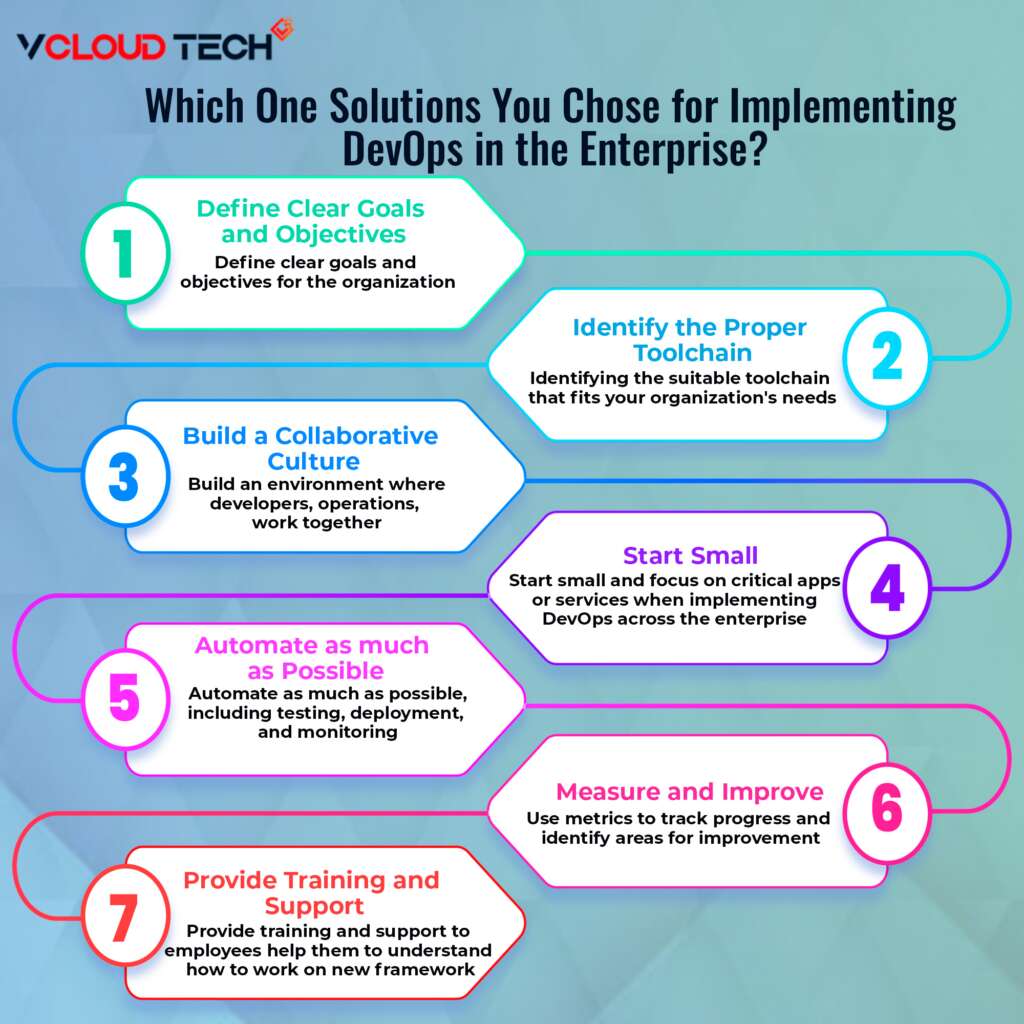
Define Clear Goals And Objectives:
Before starting with DevOps implementation, it’s essential to define clear goals and objectives for the organization. That will help you to understand what you want to achieve with Dev Ops and what metrics you should use to measure the success of your implementation.
Identify the Proper Toolchain:
Dev Ops requires several tools, including version control systems, continuous integration and delivery tools, and monitoring and logging tools. Identifying the suitable toolchain that fits your organization’s needs and requirements is essential.
Build a Collaborative Culture:
Dev Ops is about team collaboration and communication. To implement DevOps Software successfully, you need to build a collaborative culture where developers, operations, and other stakeholders work together seamlessly.
Start Small:
Implementing DevOps across the entire enterprise can be overwhelming. To avoid this, start small and focus on a few critical applications or services. Once you succeed with these, you can gradually expand to other areas.
Automate as much as Possible:
Automation is a critical component of DevOps. It helps to streamline processes, reduce errors, and increase efficiency—Automate as much as possible, including testing, deployment, and monitoring.
Measure and Improve:
Dev Ops is an iterative process, and measuring and improving continuously is essential. Use metrics to track progress and identify areas for improvement.
Provide Training and Support:
DevOps requires a significant cultural shift, and it’s essential to provide training and support to employees. That will help them to understand the benefits of DevOps and how to work within this new framework. Redgate .NET Developer Bundle allows you to quickly learn the code, regardless of whether it’s your code or a third party, and also maximizes both the speed and consumption.
By following these solutions, you can successfully implement Dev Ops in the enterprise and reap the benefits of increased collaboration, faster market time, and improved quality and efficiency.
Best Practices for DevOps in the Enterprise
Continuous Integration and Deployment:
Enterprises should adopt continuous integration and deployment practices to ensure that changes are tested and deployed quickly.
Monitoring and Metrics:
Enterprises should implement Compliance, Monitoring and Regulatory Tools to track performance and identify areas for improvement.
Collaboration and Communication:
Effective team collaboration and communication are essential for successful DevOps implementation in an enterprise environment.
Continuous Learning:
Enterprises should foster a culture of constant learning to encourage employees to stay up-to-date with the latest technologies and trends.
Conclusion
DevOps Software & Application Development Tools can help enterprises improve software delivery speed and quality, but implementing it in an enterprise environment can be challenging. Overcoming resistance to change, breaking down silos, and ensuring compliance and security are vital challenges enterprises must address. However, with executive support, cross-functional teams, automation, and effective collaboration, enterprises can successfully implement DevOps practices and reap the benefits of faster and more efficient software development.
Reach out to us and book a Free Consultation with vCloud Tech or chat with one of our representatives. Connect with us on Twitter, Facebook, Instagram, and LinkedIn for more information.



